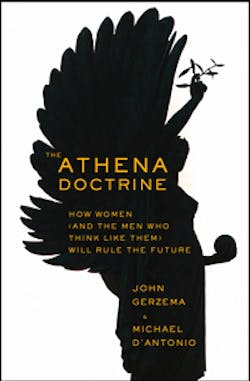Director's Message: What I rarely do, a book review
What I will share as I write this Director’s Message on International Women’s Day last Tuesday (March 8) is a book written by two researchers, John Gerzema and Michael D’Antonio, titled,“The Athena Doctrine: How Women (And Men Who Think Like Them) Will Rule The Future.”
To define masculine and feminine traits, the authors conducted two separate studies. The first involved half the participants classifying 125 human behavioral traits as masculine, feminine, or neither. Part two involved the other half of the study’s population, who received the list of words without attribution of gender and were asked to rate the importance of the virtues of leadership, success, morality, and happiness. They statistically compared the models and noted that—through age, gender, and culture—people around the world feel that feminine traits correlate more strongly with “making the world a better place.”1
For the purpose of brevity, I will only share the global consensus of an “ideal modern leader.”1 None of the highly masculine traits—for example, being aggressive, rugged, dominant, arrogant—were among the traits most highly valued.
A modern leader is a person who, according to the findings, is:
- Patient, flexible, intuitive, reasonable, passionate, empathetic, selfless, and loyal
- Someone who shares their feelings and emotions openly and honestly
- Someone who will break a gridlock through reason, not ideology
- A long-term thinker who plans for a sustainable future (not posturing for expediency)
- Cause-driven (not self-focused)
The book provides many examples of feminine styles of leadership in action. Another correlation of the study is that they found countries with higher levels of feminine thinking/leadership also have a higher per capita GDP and a higher quality of life (globally). The keys to success, as the world sees it, are tied to more traditionally associated “feminine” qualities, such as:
- Connectedness
- Humility
- Candor
- Patience
- Empathy
- Trustworthiness
- Openness
- Flexibility
- Vulnerability
- Balance
We live in a world that is increasingly social, interdependent, and transparent. The research suggests a balancing that vastly increases the capacity of both men and women to solve problems, lead, and create a good life. This is not a male vs. female issue. It is about “both/and” because “81% of people say that men and women need both masculine and feminine traits to thrive in today’s world!”1 Men vs. Women is not a zero sum game. Men can be as caring as women, and women can be as analytical and assertive as men. Our gender is who we are, not what we can be.2 We must all see feminine values not as belonging to one sex, but as a new form of innovation for today’s leadership.
So I invite you to consider adding, “The Athena Doctrine: How Women (And Men Who Think Like Them) Will Rule The Future” to your summer must-read list!
Regards,
Kristine
RDH eVillage, Director
Kristine Hodsdon RDH, MSEC, is the editorial director of PennWell’s RDH eVillage e-newsletter. She provides practice management consulting; executive coaching and team training so busy professionals easily create profitable systems that serve more clients. Visit www.prideinstitute.com with inquiries regarding her coaching and CE programs.
Web sources
1. http://eiipdf.greenbaumgilhooleys.com/the-athena-doctrine-how-women-john-gerzema...
2.http://www.slideshare.net/SinaMoore/the-age-of-athena-presentation-august-2013

